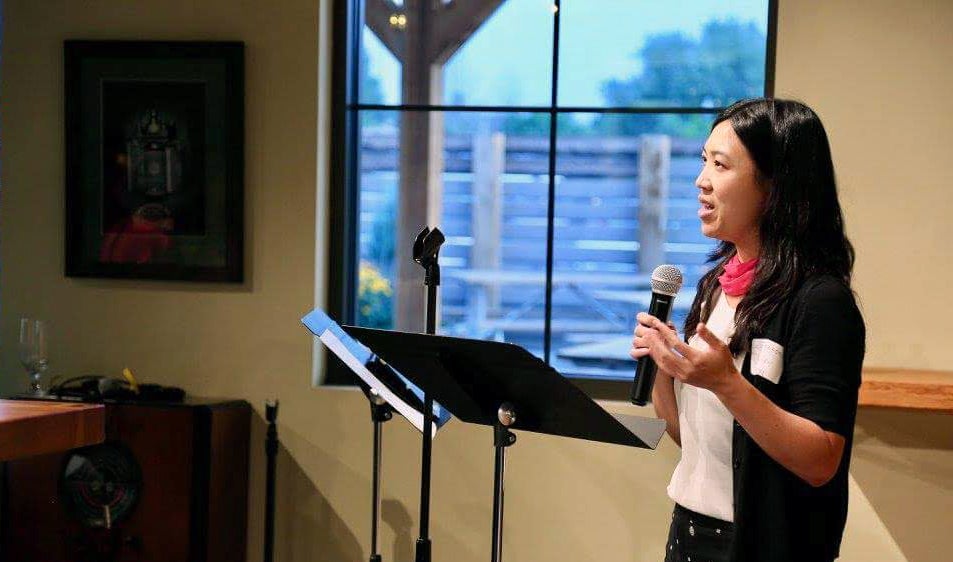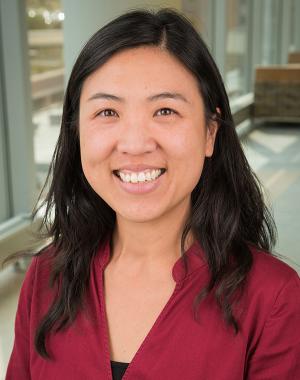Five questions for Hillary Lum
Hillary Lum was at the bedside of both her grandmother and grandfather as they took final breaths following illnesses and after only a relatively brief time in hospice care. The experience has shaped her passion as a physician and researcher who is dedicated to caring for frail, older adults.
“As a primary care geriatrician, I have the privilege of supporting patients and families as they seek medical treatment while desiring to remain as independent as possible, adapting to changes related to dementia and other illnesses, and experiencing the final days of their lives,” said Lum, an assistant professor in the Division of Geriatric Medicine, Department of Medicine at the University of Colorado School of Medicine. She also is a physician investigator at the Geriatric Research Education and Clinical Center (GRECC) at the VA Eastern Colorado Health Care System.
“I am particularly motivated to provide the best possible care to older adults with serious illnesses by integrating my research, teaching and community outreach efforts to address the needs of this vulnerable population.”
Lum conducts research to improve advance care planning for older adults and their family members that also will lead to health care system, local, state and national policies to promote effective advance care planning processes. Her current research focuses on new models of care, including where advance care planning is discussed in a group setting.
This year, she was honored with the Department of Medicine Rising Star Award, which recognizes outstanding early career faculty members who exemplify the department’s core values of excellence in patient care, research, education and community service.
Lum joined CU in 2011 and completed her Geriatric Medicine and Palliative Medicine fellowships at the university.
Away from work, she enjoys walking her two dogs, hiking, crocheting and traveling. “Despite being from the upper Midwest, I have readily adjusted to 300-plus days of sunshine and mild winters.”
1. Much of your research deals with advance care planning. First, what does this entail? How is this different from what other medical/aging experts have advocated?
As a society, we don’t like talking about getting sick, growing older, living with disability, loss of independence, or death. Yet these things are part of the human experience, and in the United States, the potential for living longer with dementia or disability is arguably increasing. More than two-thirds of us will need someone to speak on our behalf if an end-of-life decision needs to be made.
Advance care planning is a process that supports adults in understanding and sharing their personal values, life goals and preferences regarding future medical care. In lay terms, I want to make it easier for people to think about and talk about what matters to them related to future care before a medical crisis and the loss of the ability to speak for themselves.
My emphasis for advance care planning education and discussions is on primary care and community settings. Too often, future medical planning is only discussed with a lawyer and may not include considerations of the person’s medical and social situation. Additionally, medical decision-making may only happen in emergency settings or in the intensive care unit. These situations often leave out important topics, preferences, and family or close friends. With advance care planning, patients and their family and doctors can have multiple conversations over time, update advance directives, and make sure that information is known to all parties, as well as being available in the medical record.
2. Your efforts, in part, focus on respecting patient values. What does that mean in terms of medical care?
Individuals are the experts in their experiences, needs, and short- and long-term life goals. My goals in the advance care planning programs and tools that I design are to make it easier for people to think about what they want and to share those preferences. Once people know what is important to them, I work with colleagues to help the health system be more aware of those choices. This can involve education at the medical student, resident and staff levels, as well as improving resources in the electronic health record so that advance directives are readily available. When health care teams focus on identifying what the patient has discussed about their future medical care, having that information in mind can help with in-the-moment decision making about current medical treatments.
3. As you transition some of your successful research results into the clinical setting, what tools do you use and how do they work?
It’s very important to me to provide different advance care planning resources and processes to individuals outside of the clinic visit and the hospital.
Funded by the Colorado Health Foundation, and working closely with UCHealth, we launched first-of-their-kind advance care planning tools into My Health Connection, which is the patient portal of UCHealth. Our system now gives patients the opportunities to fill out a legal advance directive called the Medical Durable Power of Attorney through the secure online system that is linked to the electronic health record. Since July 2017, we’ve had more than 3,500 patients use these tools. A video highlights the importance of advance care planning for all Coloradans. (See it here: https://www.youtube.com/watch?v=NKHRV-gGA1I )
I’m very fortunate that I have ongoing input from lots of patients into how we should design and update these tools so that they are most helpful to the people using them.
I’m also part of several community groups that wondered why Colorado didn’t have easy-to-find resources for advance care planning. Thus, to increase community-based education for all Coloradans related to future medical care planning, I developed Colorado’s first free, public awareness website for advance care planning. The website was launched in July 2018. I love connecting with community members about their advance care planning needs, including providing www.ColoradoCarePlanning.org as a user-friendly, accessible resource. This resource has been well-received as we begin to disseminate it.
As part of the Denver Hospice-University of Colorado community-academic partnership, we are training community laypersons in communication skills to help discuss future medical planning among friends, family and peers. Volunteers have been an extremely helpful part of my clinical and research work. Thus, our ACP Community Guide Certification Program is a free opportunity for individuals who want to be more comfortable talking about values and preferences that are important in the setting of serious illness. More information can be found here: https://thedenverhospice.org/denver-hospice-university/advance-care-planning-certification-training/
4. One of the models you are researching is an Advance Care Planning Group Visit, called the ENgaging in Advance Care planning Talks (ENACT) Group Visit Model. What is this and how is it beneficial?
The ENACT group visit model provides a helpful way for a group of patients to meet with a medical practitioner and a social worker to learn and discuss their questions and next steps about advance care planning. We are doing these in primary care clinics at UCHealth. In these groups, facilitators encourage patients to ask and answer questions, resulting in peer-based learning. Discussions include a wide range of topics and allow diverse perspectives and personal challenges to be shared.
One patient gave us feedback on the group, stating: “I’m a little more sure now what I want and so by having this discussion group, it solved a lot of my concerns, a lot of my wondering about different things. I just feel more confident in what I want now.”
The “magic” of the group visit is the group dynamic. One patient talked about the value of the group, saying, “The different experiences that each one expressed … put me at ease to realize that there are people out there who have the same thoughts as I do, and they are in the same situation that I am in where their loved ones cannot bear talking about the subject. … It gave me more encouragement to find a way to encourage my loved ones to listen to what I have to say.”
We’re currently testing the group visit compared to mailing advance care planning materials to a group of control patients in a study funded by the National Institute on Aging and American Federation for Aging Research. Once we have these results, our next steps will be to study how to implement and spread this model to other practices.
5. What is the most important thing you learned from patients?
I love creating space or setting the stage for these types of discussions, which encourage so many people to share their own individual stories. I have the privilege of hearing what their experience has been, and often the peace of mind they have from hearing the values and preferences of loved ones during their end-of-life period.
Patients, family members and community partners also frequently remind me of the fact that advance care planning is a “medical term.” I am continually working to listen well to their concerns, the words they use, and what is most important to them to talk about.



